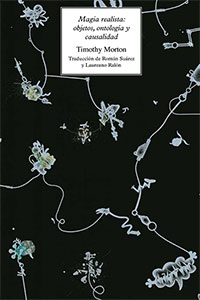Spanish translation of Timothy Morton's Realist Magic from Open Humanities Press (OA)
 Monday, March 23, 2020 at 9:18AM
Monday, March 23, 2020 at 9:18AM
The English-language version is also still available. Please see blurbs for both versions below.
Best,
Gary, Sigi and David

Traducción de Román Suárez, Laureano Raló
http://www.openhumanitiespress.org/books/titles/magia-realista/
La ontología-orientada a objetos (OOO) nos ofrece una forma novedosa y sorprendente de pensar la causalidad que toma en consideración los desarrollos de la física que se inician a principios del siglo XX. Para la OOO, la causalidad es estética. En este libro, Timothy Morton explora lo que significa afirmar que algo advenga a la existencia, que persista, y que deje de existir. Tomando ejemplos de la física, la biología, la ecología, el arte, la literatura y la música, Morton pone en evidencia el poder explicativo elegante, aunque contrario a la intuición, de la OOO para explicar cómo opera la causalidad. Traducción a cargo de Laureano Ralón y Román Suárez.
Timothy Morton ocupa la cátedra Rita Shea Guffey de inglés en la Universidad de Rice. Es autor de Ecología oscura: por una lógica de la coexistencia futura (2014), Hiperobjetos: filosofía y ecología tras el fin del mundo (2013), El pensamiento ecológico (2010) y Ecología sin naturaleza (2007), entre otros, además de ochenta artículos sobre filosofía, ecología, literatura, alimentación y música. Escribe con frecuencia en su blog Ecología sin Naturaleza.
************************
Timothy Morton: Realist Magic
Object-oriented ontology offers a startlingly fresh way to think about causality that takes into account developments in physics since 1900. Causality, argues Object Oriented Ontology (OOO), is aesthetic. In this book, Timothy Morton explores what it means to say that a thing has come into being, that it is persisting, and that it has ended. Drawing from examples in physics, biology, ecology, art, literature and music, Morton demonstrates the counterintuitive yet elegant explanatory power of OOO for thinking causality.
http://www.openhumanitiespress.org/books/titles/realist-magic/
Author Bio
Timothy Morton is Rita Shea Guffey Chair of English at Rice University. He is the author of Dark Ecology: For a Logic of Future Coexistence (2014), Hyperobjects: Philosophy and Ecology after the End of the World (2013), The Ecological Thought (2010), Ecology without Nature (2007), seven other books and eighty essays on philosophy, ecology, literature, food and music. He blogs regularly at Ecology Without Nature.
 Gary Hall | Comments Off |
Gary Hall | Comments Off | 






